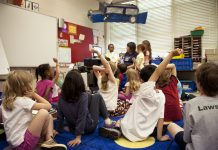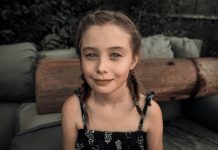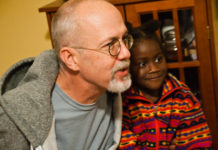Tanya’s car pulls into my parents’ gravel driveway. She is honking the horn, and waving her hand out the window. Meazi, Melese and I have been outside waiting for them to arrive from their five-hour drive from St. Paul, Minnesota. Peeking in her car, we see her boys Mintesinot and Tesfaamlak sitting in their cars seats, identical to ours, one with a cow pattern and the other with a butterfly pattern. My children have met lots of other kids adopted from Ethiopia. We have a large Ethiopian-American community in Los Angeles with whom we get together all the time. This August morning, at my parents’ lake house in northern Wisconsin, is the first time my kids are seeing kids whom they knew back in Ethiopia two years ago. They have come to spend the day and night with us.
Adopted from Ethiopia in August of 2009, Tanya’s boys were with Meazi and Melese at the orphanage. I was trying to think of an analogy, prison camp survivors? No, too extreme, our kids weren’t war prisoners. Rehabbers? I have never been in rehab, but that doesn’t quite work either. Yes, both would be experiences that were extreme and emotional but these are young children, not addicts and not prisoners. The orphanage experience is a unique one; I believe there is no analogy.
It wasn’t surprising that Meazi gravitated so quickly to Mintesinot. While usually friendly with all kids, it was as if she was made of metal and Mintesinot’s body was fully magnetized. Meazi remembered both boys. She told me that she was with Tanya’s boys at both of the orphanages, the one in the rural south, and the one that they were moved to in Addis Ababa. She said they took the long bus ride together and that a woman served them cookies and milk during the trip. Melese, eight months at the time, probably did not remember, but he too was immediately comfortable with them, perhaps just following Meazi’s lead. Meazi was all smiles as she showed Mintesinot around the house. Mintesinot read her book after book, and they scoured the giant encyclopedia of animals, Mintestinot telling her all she would ever need to know about birds of prey. “Mom,” Meazi said, “Mintesinot must be some kind of superhero reader to be able to read me all those books with that eye patch on his eye.” (Mintesinot was working on strengthening the sight in one of his eyes, and had several super cool, adhesive eye patches.)
When we went to Ethiopia to meet Meazi and Melese, we met Tanya and her husband Eric on one of the last days of our trip. When I first saw Tanya, she was taking a picture of the orphanage from the terrace of the guesthouse. Her face had the same expression of anticipation that mine had held the week before. She was about to meet her sons for the first time. Meazi and Melese were already staying with us at the guesthouse, and Meazi got piggyback rides from Tanya all over the guesthouse’s terrace. Meazi loved Tanya’s curly blond hair, and she immediately put all of Tanya’s jewelry on herself. We followed Tanya and her family on Facebook when we got home. They are the kind of family that you want to keep in touch with forever. “Mom, why is Tesfamlaak crying in this Facebook video?”
“Because he is feeling snow for the first time, Meazi, and realizing that winter in Minnesota can be quite harsh, and that snow is really, really cold.”
Watching the two five-year-olds together again, I thought about what their friendship might have been like in Ethiopia. I thought about the two of them at the communal dinner table. We have a video of Meazi leading the mealtime prayer, her small hands covering her eyes as she said the words before they ate. I wondered if Mintesinot prayed the same way, with his hands over his eyes. I wondered if they comforted each other, if they shared toys. I know from Meazi that they rode together on the bus to their orphanage school. In the video we have from that school, Meazi is at the board with a pointer, reading the English words for “blue, yellow and red” as the camera pans to the other kids sitting eagerly at their seats. While at the lake, Tanya asks Meazi if she remembers the orphanage nannies warning, “If you don’t listen the hyenas will come!’” Meazi doesn’t recall that threat but Mintestinot remembers it vividly. I think about them, two three-year-olds who have just lost everything. I think about how terrified they must have been.
I spend a lot of time thinking about everything my children have lost. The list is long. Sometimes, however, something beautiful takes place, like it did on this sunny August day on the lake. They were not four kids who had lost everything, they were four old friends squawking like seagulls and letting the spray of my dad’s boat hit their faces. Their hair was blowing wildly; their bellies were full of Pirate’s Booty and goldfish. Their arms were around each other. They were laughing boisterously as they watched eagles fly above. They were just four happy kids with their whole lives ahead of them; lives with families who adore them, lives with travel and summer adventures, lives spent with friends who know them and where they come from. Lives that aren’t just about loss, but lives, that on this sunny summer day, are full of nothing but gains.
About a year ago, I got an e-mail from a woman named Amanda, who wrote, “I was going through my girls’ adoption information this morning and was looking through my eldest’s lifebook and it has a picture of her with her best friend. Her best friend looks identical to your daughter, but they have her labeled as Meaza. If you were interested in pictures I would be more than happy to send them to you.”
Meaza was indeed Meazi. I asked Meazi about the girl, and showed her the pictures Amanda sent me. She confirmed that Almaz was her best friend at the care center and told me that they were from the same village. The first picture shows Allie, as she is now called, and Meazi playing with puzzles on the care center floor; Mintesinot is sitting between them. Thinking about Meazi’s joyful ease with Mintesinot leads me to believe that these reunions are rare and profound. Maybe it is different for kids who end up living in the same area and see each other more frequently. Maybe it is less moving. While my kids will remember swimming, driving their papa’s boat, and listening to the loons from their vacation on the lake, I know too that they will remember something else. They will remember what it’s like to throw an arm over a shoulder that is familiar, but changed, what it’s like to look into the beautiful eyes of one’s past, and what it’s like to feel the comfort and safety of sitting quietly next to an old, dear friend.




































My Ethiopian born sons also cover their eyes when they pray. They also tell stories of the hyena “warnings” they got while in Addis, and they also recently had a reunion with some great friends from the orphanage. Thank you for writing this story, and it being something that resonated in my heart.
Thank you so much for your story. What a wonderful experience for everyone. My grandson has been with our family since March and we are so blessed.
[…] past year. 1. Why African Babies Don’t Cry 2. Breastfeeding in the land of Ghengis Khan 3. Reunited Outside the Orphanage Walls 4. Falling off the Opol Wagon 5. Best World Maps for Your Child’s Room 6. Diwali Craft: Make […]